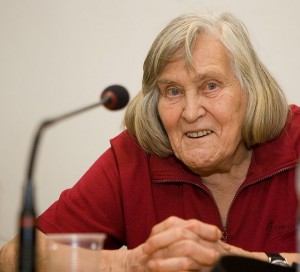ROME— Margherita Hack, an astrophysicist who explained her research on the stars in plain language for the public and who championed civil rights in her native Italy, died on Saturday in the Adriatic Sea town of Trieste, where she had headed an astronomical observatory. She was 91.
President Giorgio Napolitano’s condolence message hailed her as a “high-level personality in the world of scientific culture.”
“At the same time, she represented a strong example of civil passion, leaving a noble fingerprint in public debate and in the dialogue with citizens,” Napolitano said.
The Italian news agency ANSA quoted family friend Marinella Chirico as saying Hack died in a hospital after being treated for heart problems.
Hack headed the observatory in Trieste, the first woman to hold that post, from 1964 to 1987, and was a popular and frequent commentator in Italian media about discoveries in astronomy and physics.
The current director of the observatory, Stefano Borgani, told Sky TG24 TV that Hack was one of the first astronomers to “have the intuition” that the future of astronomical observation lay in using space satellites.
An atheist who decried Vatican influence on Italian politicians, Hack helped fight a successful battle to legalize abortion in Italy. She unsuccessfully lobbied for the right to euthanasia and also championed gay rights. Among her victories was a campaign against construction of nuclear reactors in Italy.
A vegetarian since childhood, she also was an advocate for animal protection and lived with eight cats and a dog.
Hack, an optimist with a cheerful disposition, studied the heavens in the firm belief there was no after-life.
“I have no fear of death,” Hack once said in a TV interview. “While we are here, death isn’t” with us.
“When there is death, I won’t be here,” she said.
Among the many Twitter comments about her passing was one from an admirer who wrote that Hack was “so great and nice that God will pretend not to exist so as not to upset her,” the Italian news agency LaPresse noted.
She liked to joke that the “first and last” time she was in a church was for her marriage to fellow native Fiorentine Aldo De Rosa, in 1944. She agreed to a church ceremony only because the groom’s parents were very religious. Hack dressed simply in life, including for her own wedding, when she wore an overcoat-turned-inside out for a bridal gown. She and her widower, 93, had no children.
Hack enrolled at the University of Florence as a student of literature, but after one class, switched to physics. By the early 1950s, she was an astronomer at the Tuscan city’s astronomical observatory.
She was also an athlete, excelling in track. Specializing in the long jump and high jump from 1939 to 1943, she won national university championships and placed high in national championships.
Hack was active in left-wing politics, including most recently supporting the governor of southern Puglia, Nicki Vendola, one of Italy’s few openly gay politicians.
“With Margherita Hack’s passing, we lose an authoritative voice in favor of civil rights and equality,” said Fabrizio Marrazzo, a spokesman for a gay advocacy group, Gay Center. “More than once, Hack came out in favor of gay rights, civil unions and the dignity of gay families.”
Italy’s foreign minister, Emma Bonino, who as a leader of the tiny Radical Party helped wage battles to legalize divorce and abortion in Italy, said Hack was “an extraordinary figure.”
“With her vanishes not only a great scientist but a free spirit, deeply intellectually honest,” ANSA quoted Bonino as saying.


